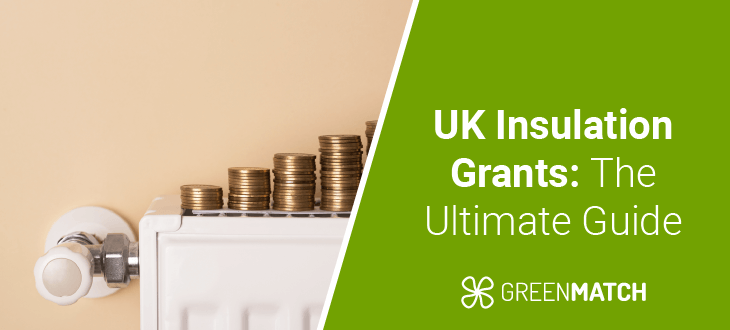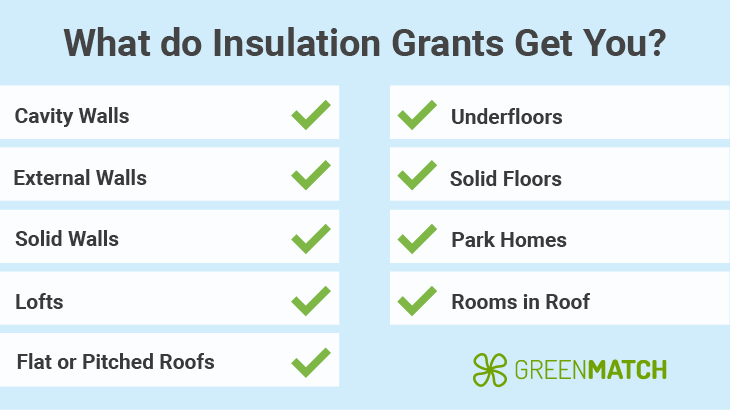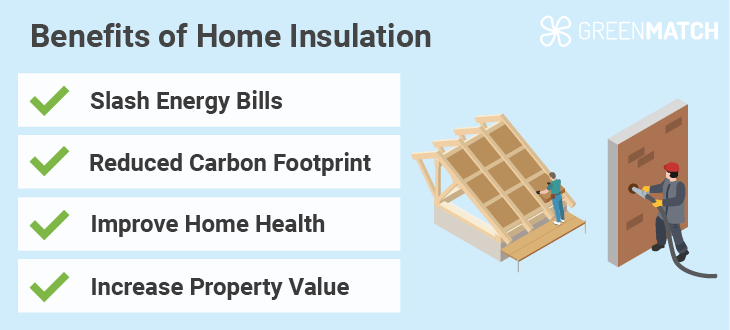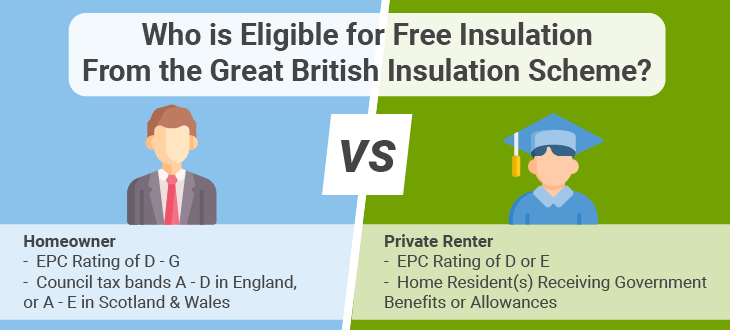Answer these simple questions and we will find you the BEST prices
Which type of solar quotes do you need?
It only takes 30 seconds
100% free with no obligation

Get Free quotes from insulation specialists near you

Save money by comparing quotes and choosing the most competitive offer

The service is 100% free and with no obligation
- GreenMatch
- Insulation
- Insulation Grants
Insulation Grants: A UK Guide


- The two main government grants for insulation in the UK are the Great British Insulation Scheme (GBIS) and the Energy Company Obligation (ECO4) scheme.
- Both grant schemes are currently active until March 2026.
- Floor, wall, and loft insulation can save you up to £630 – £730 on annual energy bills while cutting your CO2 emissions by 1.4 to 1.7 tonnes.
The UK housing stock is considered one of the least energy-efficient in Europe. So much so, that the Office of National Statistics (ONS) claims the average energy efficiency rating (EPC score) in England by the end of 2023 was just D. Worse off, more than 80% of pre-1930s properties were classed as bands D - G in terms of energy efficiency.
Poor home insulation is at the core of this domestic energy crisis, resulting in soaring energy bills, damp homes, and a higher risk of illness. That’s why the UK government is poised to help fuel-poor and energy-inefficient homes with insulation upgrades through a series of grant schemes. Currently, the Great British Insulation Scheme (GBIS) and the Energy Company Obligation (ECO4) are active to help provide free home insulation and reduced-cost upgrades to qualifying homes.
This complete guide by GreenMatch UK will give you all the information you need about insulation grants in the UK, including perks, qualification criteria, application, and much more.
Ready to insulate your home? Let GreenMatch UK handle the pesky research and vetting for you. Instead of spending countless hours surfing websites and scheduling phone calls with installers, simply spend 30 seconds filling out our online form and we’ll send you up to 3 free home-tailored quotes from professional installers right in your area. Click below to begin!
- Describe your needs
- Get free quotes
- Choose the best offer
It only takes 30 seconds



Home insulation grants in the UK
Home insulation grants in the UK are a series of government initiatives aimed at making the cost of insulation upgrades more affordable and accessible to low-income, fuel-poor, and energy-inefficient households.
Alongside improving the efficiency of the UK housing stock and helping homeowners and tenants combat fuel poverty, these grants are in place to keep the UK moving towards its ambitious Net Zero by 2050 goal.
The two main grant schemes currently active in the UK are the Great British Insulation Scheme (GBIS) and the Energy Company Obligation (ECO4), both of which provide a wide range of home insulation upgrades for qualifying households.
The UK Government is gearing up to launch the Warm Homes Plan in spring 2025. This initiative seeks to replace older grant programs with a streamlined funding model.
Starting on April 1, 2025, and expected to run for 3 to 5 years, the plan will be administered by local authorities. The scheme offers two main types of support:
- Energy performance upgrades: Up to £15,000 per property can be allocated to improve energy efficiency through measures like insulation, draught-proofing, and new glazing.
- Low-carbon heating: Another £15,000 is available for the installation of low-carbon heating systems, particularly for homes that aren’t connected to the gas grid.
By simplifying the application process and providing substantial financial support, the Warm Homes Plan aims to significantly enhance the energy efficiency and sustainability of UK homes.
If you are a resident of Northern Ireland, be sure to check out our page on insulation grants ni.
What do insulation grants get you?

Insulation grants can get you a wide range of home insulation upgrades, but what you receive, and how you receive it, can differ depending on which grant scheme you apply for. In general, the range of domestic insulation measures provided by the UK’s insulation grant schemes are:
- Cavity wall insulation grants
- External wall insulation grants
- Solid wall insulation grants
- Internal wall insulation grants
- External wall insulation grants
- Loft insulation grants
- Flat or pitched roof insulation grants
- Under floor insulation grants
- Solid floor insulation grants
- Park home insulation grants
- Room-in-roof insulation grants
The Great British Insulation Scheme (GBIS) provides a single insulation upgrade per household, such as wall insulation. This is done so the scheme can prioritise its reach across the UK. The most fitting upgrade is decided after a property assessment to determine the most effective measure to improve your home’s energy efficiency.
On the other hand, the Energy Company Obligation (ECO4) works with a more whole-house approach, aiming to maximise a home's energy efficiency through a range of upgrades. Alongside free insulation, the ECO4 even provides heating system upgrades, repairs, and replacements.
The energy companies themselves usually determine the choice of insulation and funding. This can also include the material, for example, spray foam insulation grants. In some cases, a grant could mean full coverage for low and mid-tier upgrades but may require a contribution from the household for high-cost measures.
Benefits of insulating your home

Home insulation is a highly effective way to upgrade your home, protect your savings, and improve your property. With a wealth of benefits justifying the investment, low U-value insulation also helps contribute to a healthier planet by drastically reducing your carbon footprint.
Here are just some of the key benefits that proper home insulation can bring:
- Slash energy bills: Complete home insulation can bring you massive savings. Wall and loft insulation alone can reduce your home heat loss by up to 60%, saving you up to £650 on your annual energy bills.
- Reduce carbon footprint: The UK housing stock is well known for its inefficiency, with domestic homes emitting more CO2 than all the cars in the UK combined. Properly insulating your home can reduce domestic carbon emissions by up to 1.7 tonnes annually, helping create a healthier planet.
- Improve home health: Damp and drafty homes are a breeding ground for mould, mildew and rot. Not only is this harmful to your home’s structural integrity but also your health. Mould increases the risk of respiratory illnesses and asthma. Properly insulated homes have a dry and balanced inner climate that keeps your home structurally safe and protects your well-being.
- Increase property value: Properly insulated homes have a much higher market value. This is because insulation increases your home’s Energy Performance Certificate (EPC) score, making your home more attractive to potential buyers and renters.
With all things considered, home insulation is one of the most effective means of protecting your health, property, savings, and the environment, all with one investment. Available UK grant schemes are there to assist in carrying out such upgrades for qualifying households.
What are the available insulation grants in 2026?
As of 2026, the two main nationwide grant schemes for insulation in the UK are the Great British Insulation Scheme (GBIS) and the Energy Company Obligation (ECO4). Both the ECO4 and the GBIS scheme are accepting applicants until March 2026, but it is advised to apply sooner than later.
Here is how the two schemes differ from one another:
- Scope: While the Great British Insulation Scheme is a house insulation grant that focuses on delivering a single measure per household, the ECO4 takes a more whole-house approach, providing multiple energy efficiency measures.
- Responsibility: While the Great British Insulation Scheme is a responsibility enacted by the UK government, the ECO4 scheme works differently by placing the responsibility directly on energy providers themselves.
- Assistance: The Great British Insulation Scheme, as the name suggests, only provides qualifying households with insulation upgrades. On the other hand, the ECO4 scheme provides a wide range of home upgrades for energy efficiency, including heating system maintenance, repairs and replacements, smart heating controls and more.
While there may be only two active schemes to choose from, there are some other avenues of support provided by independent initiatives and smaller government schemes:
- The British Gas Energy Trust: This independent charity scheme was set up by British Gas to help fuel poor and low-income households free themselves from energy debt. It does so through direct financial assistance, but also consulting and guidance on how to navigate the cost of living crisis. Visit the official British Gas website to learn more.
- The Warm Home Discount Scheme: While not on the same scale as a grant scheme, this small-scale assistance program provides eligible households with up to £150 in energy cost assistance every year. This sum is deducted directly from the household electricity bills, but can also be applied as a discount on gas bills instead. To find out more, contact your energy provider for more details.
Who is entitled to grants for free insulation?

To get grants for insulation in the UK, you must meet a series of qualifying criteria. Both UK insulation grant schemes generally look for the same indicators, such as low-income, home EPC ratings below D, recipients of government benefits, and council tax bands A - D in England, and A - E in Scotland and Wales.
There are two main routes to apply for a free insulation grant from either the GBIS or ECO4 scheme. These are applying as a homeowner, or as a home renter. The qualification criteria are similar in both cases but may have slight differences.
DIY installations are not fundable through a grant scheme! To receive grants for home insulation, you are required to work with a professional installer who is PAS 2030 – 2035 certified. The Publicly Available Specifications (PAS) are a series of installer requirements that help make sure that your insulation is installed professionally and with quality workmanship.
Low-income households
In general, low income in the UK is considered to be a gross annual income of less than £31,000 a year.
Additionally, a household's status of low income can also be reflected in its council tax band range. Council tax bands are used to determine how much council tax you pay based on your property value.
Homes within bands A to D in England, and A to E in Scotland and Wales can qualify for grants from either scheme.
EPC rating of D or below
The Energy Performance Certificate (EPC) rating measures your home’s energy efficiency. It helps you understand how much energy your home consumes, and its subsequent environmental impact. EPC ratings range from A (most efficient) to G (least efficient).
For the Great British Insulation Scheme, the EPC rating qualification range differs if you own or rent your home:
- Private home renters: EPC rating of D or E.
- Homeowners: EPC rating of D to G.
If you don’t know your home EPC rating, you can arrange an inspection with an accredited housing assessor via the official UK government portal. Many professional insulation installers are also able to conduct an EPC assessment of your property.
If you are a homeowner, your property's EPC rating will not be the only qualification that matters. You must also qualify for the correct council tax band ranges as mentioned in the previous section.
Households that receive at least one benefit
Individuals, both homeowners and tenants, who receive UK government assistance through allowances and benefit schemes are very likely to qualify for assistance from the Great British Insulation Scheme.
The current qualifying benefits that are recognised as eligible are as follows:
- Income-based Job Seekers Allowance
- Income-related Employment and Support Allowance (ESA)
- Income Support
- Pension Credit
- Guarantee Credit
- Working Tax Credit
- Child Tax Credit
- Universal Credit
- Housing Benefit
Pensioners and those over 70 can still get free loft insulation even if they don’t meet the qualification criteria for a grant. Whilst age alone isn’t a qualifying factor, pensioners can receive assistance if they belong to one of two groups; the low-income group, or the general group.
Low-income group:
- Homeowners and private renters WITH a home EPC rating of E and below (when renting) or D and below (when a homeowner).
- Someone in the household receives a means-tested benefit (some examples are the Pension Credit Savings and Pension Credit Guarantee).
- You have an annual gross income below £31,000, live in social housing, and are vulnerable to the cold conditions you’re experiencing (age can be a consideration here).
General group:
- Homeowners who live in council tax band A - D in England, or A - E in Scotland and Wales, AND have an EPC rating of D or below.
As for the ECO4 scheme, pensioners may qualify for free or reduced cost insulation assistance through ECO4’s flexible eligibility based on reasons such as:
- Your household is considered low-income.
- You or someone in your household has a medically diagnosed health condition that can be worsened by the cold.
- You or someone in your household has a child under the age of 5 or a resident over the age of 65.
To get a full understanding of whether you qualify for the ECO4 scheme, it’s recommended to contact your energy provider to learn more about the application process.
Do insulation grants differ for different regions in the UK?
Generally, both the Great British Insulation Scheme (GBIS) and the Energy Company Obligation (ECO4) provide the same grant qualifications, provisions, and application process throughout the entire UK, comprising England, Scotland and Wales.
However, the GBIS and ECO4 schemes are not available in Northern Ireland. For this region, you will need to make use of the Northern Ireland Sustainable Energy Program (NISEP).
The NISEP is a lump fund collected from all Northern Ireland electricity consumers through a public service obligation. This fund is then redistributed to help fuel-poor and low-income homes with energy efficiency upgrades. Alongside home insulation, NISEP also provides funding for boiler upgrades, draught-proofing, lighting and much more. To learn more, you can visit the official Energy Saving Trust UK website for qualification criteria and application.
How can you apply for insulation grants?
To apply for The Great British Insulation Scheme, you can directly visit the UK government portal for all the information you need. This also includes a qualification survey, arrangement of a housing assessment and many other details.
To apply for the Energy Company Obligation (ECO4) Scheme, contact your energy supplier directly to learn more about the criteria and how to apply. This is because your energy company is directly responsible for carrying out the housing assessment and providing the grant.
Both schemes are currently running and accepting applicants until March 2026.
It’s also possible to apply for a grant scheme through British Gas. The British Gas Energy Trust is a funding initiative that supports more than 2 million UK residents with energy debt grants, funding and advice. Since launching the trust in 2014, the fund has contributed over £200 million through donations.
To receive a grant, it’s very important to work with a professional installer. This includes your installer having a PAS 2030-2035 certification to make sure the job is done to the highest standards.
However, finding the right installer at the best bargain is no easy task. Customers often find themselves stuck in an endless cycle of research and vetting. With the services provided here at GreenMatch UK, you can say goodbye to those days!
Instead of spending endless hours surfing the web and scheduling phone calls with installers, just spend 30 seconds filling out our simple online form, and receive up to 3 free home-tailored quotes from our network of trusted installers. The best part? Our services are completely free of charge and come with no obligations. Click below to begin!
- Describe your needs
- Get free quotes
- Choose the best offer
It only takes 30 seconds



FAQ
As of 2024, there are currently two government grant schemes available for home insulation in the UK. These are the Great British Insulation Scheme (GBIS) and the Energy Company Obligation (ECO4) scheme.
Both the Great British Insulation Scheme (GBIS) and Energy Company Obligation (ECO4) aim to provide fuel-poor and low-income homes with energy efficiency upgrades.
The prime candidates are generally those who are classed as low-income earners, recipients of certain government benefits, homes with an EPC rating below D and those in council tax bands A – D in England, or A – E in Scotland and Wales.
Homes that qualify for the Great British Insulation Scheme can receive free loft insulation from British Gas. These qualifications are a home EPC rating below D and residents who receive one or more government benefits. To find out if you qualify, you can also arrange a home assessment with British Gas through their official website.
Pensioners can get free loft insulation if they qualify for either the Great British Insulation Scheme (GBIS) or the Energy Company Obligation (ECO4). It’s important to note that age alone is not a qualifying factor when considering insulation grants for pensioners. To receive free loft insulation, your home’s EPC rating, and whether you are a recipient of government assistance will also matter.
Both the Great British Insulation Scheme (GBIS) and the Energy Company Obligation (ECO4) provide grants for insulation in Wales. The application process, eligibility criteria, and provisions are all the same throughout the UK.
An Energy Performance Certificate (EPC) rating tells you how energy-efficient your property is. This also gives you an idea of how costly it is to keep your home warm, and how much carbon dioxide your home emits.
Homes are graded on a scale from A (most efficient) to G (least efficient). Homes with an EPC rating below D are considered inefficient and can qualify for grant schemes in the UK. All homes require an EPC rating, especially if you plan on buying, selling, or renting.

Akif is a copywriter at GreenMatch since 2023. With a keen interest in community sustainability, green solutions and the role of digital media in identifying climate trends, he aims to hone in on his background in International Studies and Digital Media to provide a multidisciplinary approach to written content rooted in credible research and accuracy.
We strive to connect our customers with the right product and supplier. Would you like to be part of GreenMatch?

